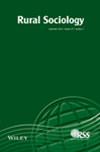The Impact of Rural Development Policy on Social Capital: Measurement, Heterogeneity, and Implications for Collective Action
IF 1.9
3区 社会学
Q2 SOCIOLOGY
引用次数: 0
Abstract
In rural development research, social capital (SC) complements the causal gap between the endowment of resources and other capital in a community and the performance of collective actions, such as common‐pool resource management. However, the concept of SC is ambiguous and its measurement is controversial. This study focuses on rural SC and attempts to measure it inductively using data from 994 Japanese communities related to various collective actions (22 types), rather than deductively piling up the detailed components of SC, as in prior studies. In particular, we evaluate the impact of Japan's Multifunctional Payment System (MPS)—a rural development policy designed to support collective agricultural activities such as the maintenance of farm roads and irrigation facilities—on the accumulation of SC. To this end, we employ hierarchical latent variable models to capture the multidimensional and hierarchical structure of SC, and spatial regression models to assess the policy's causal impacts on SC accumulation while considering spatial heterogeneity. The results show that SC has spatial heterogeneity and a hierarchical structure, depending on the internal (bonding‐type) and external (bridging‐type) components, as well as on the difference between general activities and collective agricultural actions. The SC accumulation is strongly correlated with traditional and agriculture‐related activities. Furthermore, policies increase comprehensive SC by approximately 20% but are more effective for internal SC than for external SC. These results suggest the need for policy options such as agglomeration bonuses when expanding the range of collective actions. They also imply that soft projects to strengthen linkages between rural and urban residents (bridging‐type SC) will be important in the future. Other findings indicate that the reinforcement of agricultural corporations and educational facilities are also effective in accumulating SC.农村发展政策对社会资本的影响:测量、异质性及其对集体行动的影响
在农村发展研究中,社会资本(SC)弥补了社区资源禀赋和其他资本与集体行动(如共同资源管理)绩效之间的因果差距。然而,SC的概念是模糊的,其测量是有争议的。本研究的重点是农村的集体行为,并试图使用与各种集体行为(22种类型)相关的994个日本社区的数据来归纳地测量它,而不是像以前的研究那样演绎地堆积起集体行为的详细组成部分。特别是,我们评估了日本多功能支付系统(MPS)的影响,这是一项旨在支持集体农业活动(如农场道路和灌溉设施的维护)的农村发展政策,对SC积累的影响。为此,我们采用分层潜变量模型来捕捉SC的多维和分层结构。和空间回归模型,在考虑空间异质性的情况下,评估政策对SC积累的因果影响。结果表明,农业生产具有空间异质性和层次结构,这取决于内部(粘合型)和外部(桥接型)成分,以及一般活动和集体农业活动之间的差异。SC积累与传统和农业相关活动密切相关。此外,政策增加了大约20%的综合SC,但对内部SC比外部SC更有效。这些结果表明,在扩大集体行动范围时,需要有集聚奖金等政策选择。他们还暗示,加强城乡居民之间联系的软项目(桥接型SC)在未来将是重要的。其他研究结果表明,农业公司和教育设施的加强对SC的积累也是有效的。
本文章由计算机程序翻译,如有差异,请以英文原文为准。
求助全文
约1分钟内获得全文
求助全文
来源期刊

RURAL SOCIOLOGY
SOCIOLOGY-
CiteScore
4.60
自引率
13.00%
发文量
47
期刊介绍:
A forum for cutting-edge research, Rural Sociology explores sociological and interdisciplinary approaches to emerging social issues and new approaches to recurring social issues affecting rural people and places. The journal is particularly interested in advancing sociological theory and welcomes the use of a wide range of social science methodologies. Manuscripts that use a sociological perspective to address the effects of local and global systems on rural people and places, rural community revitalization, rural demographic changes, rural poverty, natural resource allocations, the environment, food and agricultural systems, and related topics from all regions of the world are welcome. Rural Sociology also accepts papers that significantly advance the measurement of key sociological concepts or provide well-documented critical analysis of one or more theories as these measures and analyses are related to rural sociology.
 求助内容:
求助内容: 应助结果提醒方式:
应助结果提醒方式:


